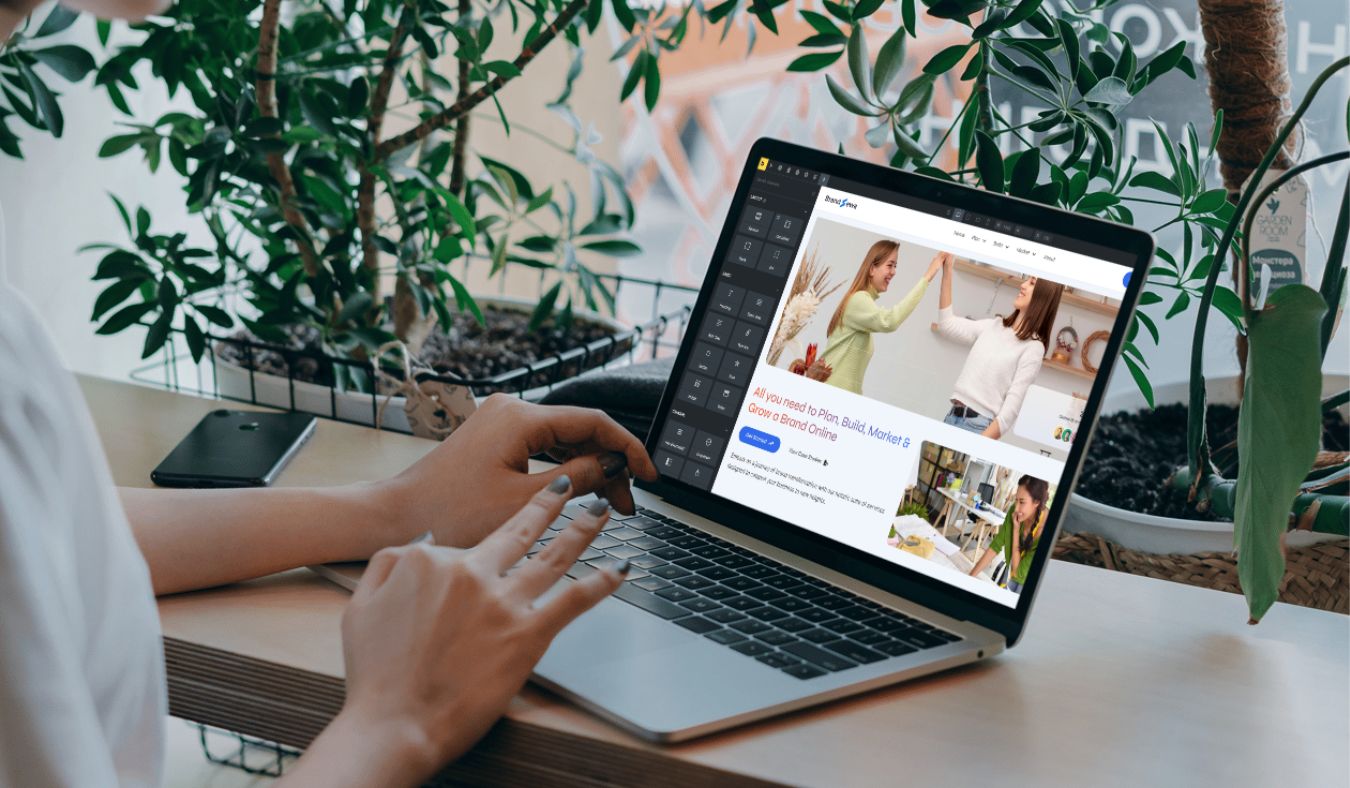Imagine your website as the digital storefront of your business. Choosing how to build it is like deciding whether to rent a pre-furnished shop in a bustling mall (website builder) or hire an architect and build a custom space from the ground up (custom website). Both can work, but the best choice for YOU is a major decision.
Let’s be honest – there’s a lot of hype and confusing information out there about websites. This blog cuts through the noise. We’ll break down the pros and cons of website builders versus custom development without the usual bias. It’s NOT always about picking the fanciest or most expensive option.
Think of this as your roadmap. By the end, you’ll have a much clearer idea of which path aligns with your specific business needs, budget, and your own DIY comfort level. Ready? Let’s dive in!
1. Website Builders – The Pros & Cons
Website builders are the gateway drug to the world of web design (said with affection!). They’ve made it possible for non-technical people to launch their own sites, which is amazing. But it’s important to understand both their strengths and limitations.
Pros
- Ease of Use: If the phrase “HTML code” makes you break out in a cold sweat, builders are your friend. Visual interfaces let you drag, drop, and arrange elements without touching a single line of code.
- Affordability: Most builders offer a range of plans, including very budget-friendly options for getting started. You can often connect a domain you already own, keeping costs down further.
- Speed: Need a website like, yesterday? Builders let you launch a basic but professional-looking site within a few hours if you hustle. Perfect for testing an idea or if you have a hard deadline.
- All-in-One: The best website builders include your domain registration, hosting, and basic tools to help people find your site. This convenience is a major plus for beginners.
Cons
- Limited Customization: Yes, you get templates, but everyone is using them. Achieving a truly unique look can be tough, or require getting creative with workarounds within your chosen builder’s limitations.
- Feature Limits: Often the “good stuff” like advanced e-commerce tools, membership areas, or complex integrations require pricier plans. Do thorough research on what’s included at each tier.
- Long-Term Costs: Monthly or annual subscriptions seem cheap at first. But over several years they add up, and you never truly own your site. Migrating from a builder can be a pain if you outgrow it.
- Not as Scalable: If your business suddenly takes off, you might hit limitations of your builder’s plan. Suddenly needing more storage or the ability to handle more traffic can lead to forced upgrades or slowdowns.
Who Are Website Builders Best For?
- Solopreneurs on a shoestring budget
- Businesses needing a simple informational site (portfolio, basic brochure-style)
- Those who want to test a business idea quickly before investing heavily
Popular Traditional Website Builders
- Wix: Known for user-friendliness, vast template library, good for beginners. Offers a range of plans from basic to e-commerce focused.
- Squarespace: Emphasizes beautiful, design-forward templates. Excellent for visual businesses (photographers, artists, etc.). Less customizable than some competitors.
- WordPress.com: The hosted version of WordPress. Simpler than self-hosting, but offers less flexibility. Good for those wanting the power of WordPress without the technical setup.
- Shopify: E-commerce powerhouse. Intuitive for building online stores, even complex ones. If selling is your primary website goal, it’s worth considering.
Tips: Even if you start with a builder, it can be a stepping stone. You can always reinvest profits in a custom site later!
2. Custom Websites – The Pros & Cons
Think of custom websites as hiring a master builder to create your dream home. You get complete control over the design and every little detail, but it comes with a higher price tag and more responsibility on your part.
Pros
- Unique Design: With custom development, the only limit is your imagination (and budget!). Standout websites create a memorable experience and reinforce your brand unlike any template ever could.
- Ultimate Control: Need a very specific feature for your business? Custom development makes it happen. No more feeling constrained by the limitations of a website builder.
- Scalability: A well-built custom website can grow with your business. If planned properly, you won’t have to worry about hitting artificial limits as you expand.
- SEO Advantage (Potentially): While good SEO is achievable on any platform, custom code can sometimes be fine-tuned in ways that builders can’t, giving you a slight edge in search results.
Cons
- Higher Cost: Custom development is almost always more expensive than website builders. Costs range wildly based on complexity, but even simple custom sites are several times the price of a DIY option.
- Longer Timeline: Custom builds take patience. From finding the right developer, to the back-and-forth of design and development, this isn’t a get-it-next-week solution.
- Technical Reliance: Unless you’re planning to learn to code yourself, you’ll likely need a developer on retainer for updates, security fixes, etc., even if your site is built on a CMS.
- Finding the Right Dev: This is not like ordering a pizza. Bad developers can cost you serious time and money. Be prepared to invest time in finding someone whose work you love and who understands your vision.
Who Are Custom Websites Best For
- Businesses with complex needs: Unique functionality, unusual integrations, etc.
- Brand Obsessed: Businesses needing a high-design site to impress a specific clientele.
- Growth-Focused: Companies who know their website is central to scaling their business and are willing to invest accordingly.
Tips: “Custom” doesn’t always mean built from scratch. Many skilled developers use frameworks or starter code to speed things up, keeping some of the benefits of custom without reinventing the wheel each time.
3. When to Choose a Website Builder
Website builders are powerful tools when used in the right circumstances. Let’s break down the ideal scenarios where they’re often the smartest choice:
Best For:
- Small Businesses on a Tight Budget: If you’re bootstrapping a startup or running a side hustle, website builders let you get online without breaking the bank. Many offer free plans with basic features to get you started.
- Solopreneurs: Consultants, freelancers, or artists needing a professional online presence to showcase their work – a simple but beautiful builder-based site is often more than enough.
- Simple Sites: Need a website that’s primarily informational? Builders are fantastic for brochure-style sites or basic blogs where fancy features aren’t crucial.
Good If:
- You’re Comfortable with DIY: Patience and a willingness to poke around in tutorials are needed for the best results. If you enjoy figuring things out yourself, builders can be empowering.
- Happy with Templates (Mostly): You’re okay with your site looking somewhat like others out there, or are prepared to get creative with colors, fonts, and images to personalize a template.
Consider If:
- Future Growth is Uncertain: New ventures sometimes pivot or change direction. A builder lets you get a good website up quickly, then reinvest profits in something more customized once your business model is proven.
Real-World Examples
- Local Service Provider: Plumber, house cleaner, dog walker… a simple builder site with your info, service area, and a contact form is perfect for attracting local clients.
- Crafter Selling Online: If you have just a few products, website builders can integrate with e-commerce platforms simply, avoiding the complexities of a full custom store.
- Consultant’s Portfolio: Sharing your expertise, case studies, and testimonials is the priority – a clean, builder-based site achieves this without fuss.
4. When to Choose a Custom Website
If website builders are like renting a pre-furnished space, think of custom websites as building your dream house. It requires more investment, but the payoff can be substantial for the right businesses.
Best For:
- Established Businesses: Companies with a proven track record can treat a custom website as a business growth tool. The potential ROI makes the higher cost justifiable.
- Unique Features or Complex Functionality: Need something beyond a basic contact form or shop? Custom development is the only way to achieve truly bespoke website features. Examples include highly specialized booking systems, membership platforms, or unusual interactive elements.
- Needing Branding that Truly Stands Out: Mass-market website builders all have a certain…sameness. Custom design breaks free of this, allowing your site to communicate your brand personality in ways templates cannot.
Good If:
- You Have the Budget and Time: Custom sites are an investment in both money and the timeline for completion. Be honest with yourself about whether you have both to spare.
- You See Your Website as a Long-Term Asset: This isn’t about a quick fix, it’s about a website that actively works for your business for years to come.
Consider If:
- Search Engine Visibility (SEO) is Crucial: While builders can be SEO-friendly, custom code sometimes allows for a level of optimization that’s harder to achieve on those platforms. If organic search traffic is key to your business, custom gives you an edge.
- Your Site is Central to Lead Generation or Revenue: If your website IS the business (e-commerce, SaaS products, etc.), the extra control and scalability of custom development are often worth the cost.
Real-World Examples
- E-commerce with a Twist: Niche stores with unique shipping needs, subscription boxes, or complex product variations often require custom solutions to work smoothly.
- SaaS (Software as a Service): The entire product lives on your website. Custom development ensures the user experience is flawless and secure.
- High-End Client-Facing Businesses: Think luxury real estate, bespoke jewelers, etc. A stunning custom website reflects the level of quality your customers expect.
Tips: “Custom” doesn’t mean starting from absolute zero. Frameworks exist to give developers a headstart, controlling costs. Ask potential developers about their process!
5. Hybrid Options
Sometimes the best solution falls between a fully DIY website builder and completely bespoke custom development. Here’s one common hybrid approach:
- Template as a Starting Point: Browse the vast libraries of templates available on website builders or even for content management systems like WordPress. Find one that has the overall layout and structure you like, then…
- Customize with a Pro: Hire a developer to tweak the template beyond what you can easily do yourself. This might involve custom code for specific features, truly unique design elements, or improving the site’s performance.
Pros of Going Hybrid
- Cost-Effective: Often cheaper than a fully custom site while getting you a more unique result than pure DIY.
- Faster: Building on a foundation speeds up development compared to starting from scratch.
- Good Compromise: Get some customization without feeling lost in the world of web development.
Is Hybrid Right For You?
This option works well if you have a modest budget, some tech understanding (or willingness to learn the basics), and find a template that’s almost perfect but not quite.
6. AI Website Builders – Exploring the Cutting Edge
AI is starting to change the website creation landscape, and it’s important to understand both the potential and the limitations of this evolving technology.
What are AI Website Builders?
- The Basic Idea: You provide some information about your business (type, desired style, etc.), and the AI generates designs, suggests content, and optimizes elements based on its vast data analysis.
- Levels of AI Sophistication: Some are simply enhanced drag-and-drop builders with AI-powered suggestions. Others aim to generate a nearly complete website with minimal input from you.
- The Promise: Faster website creation, especially for those with no design experience, with a sprinkling of that “wow” factor.
Pros of AI Website Builders
- Speed: Potentially, the fastest way to get a basic site outline.
- Idea Generation: If you’re stuck creatively, AI suggestions can spark inspiration.
- Accessibility: Could make website building even more DIY-friendly for non-technical users.
Cons of AI Website Builders
- Quality Can Be Inconsistent: AI is still learning, and results may range from surprisingly good to laughably bad.
- Limited Control: You’re often at the mercy of the AI’s algorithms, which may not match your exact vision.
- The Human Touch: Generic AI-made text or imagery shouldn’t replace your unique voice and brand personality.
- Evolving Tech: This landscape is changing fast! Platforms that seem great today could be outdated in a year.
When to Consider AI Builders
- Experimenting: If you’re curious about AI or just want to play around with ideas, they can be fun to try.
- Ultra Basic Needs: For a short-lived, purely informational site, they might get the job done.
- Tech-Forward Positioning: If part of your brand is being cutting-edge, using an AI tool could reinforce that image.
When AI Builders Aren’t the Best Fit
- Unique Branding: AI won’t understand the nuances of your business the way a human designer or your own efforts will.
- Complex Needs: Don’t expect AI to handle e-commerce, intricate features, or truly custom solutions.
- SEO Focused: For now, human expertise in optimizing sites for search engines is still superior.
Popular AI Website Builders
- Wix ADI (Artificial Design Intelligence): Wix’s AI-powered builder asks questions, then generates site designs in seconds. Good for seeing quick concepts.
- Zyro: Emphasizes speed with AI tools for generating text, design assistance, and basic heatmap functionality (where people click)
A Few More to Keep an Eye On:
- Durable.co
- GoDaddy Studio
The Crucial Caveat: AI website building is a rapidly changing field. New players emerge often, and the features offered by these platforms improve constantly.
Recommendations for Readers:
- Take advantage of free trials! The best way to know if a builder works for you is to play around with it.
- Read recent reviews. See how these platforms perform in the real world, not just the glossy marketing speak.
- Consider the future of AI: Even if not fully satisfied with what’s out there now, this technology is here to stay!
Tips: Treat AI website builders as powerful tools, not magic wands. The best results will likely come from combining AI’s suggestions with your own strategic input and refinements.
7. Finding Your Perfect Website Fit
Remember, building a great website isn’t a race to the fanciest tech or the biggest budget. It’s about choosing the solution that empowers YOU to put your best digital foot forward. There’s no shame in starting small with a builder and evolving or seeking out professional help as your website needs grow.
Time for a Website Reality Check…Ask Yourself:
- How much money can I realistically invest? Be honest about both upfront costs and any recurring fees.
- What’s my tech comfort level? Do I love to tinker and learn, or do I want a mostly hands-off experience?
- What features are non-negotiable? Separate basic needs from things that would be cool, but aren’t crucial for Day 1.
- Where do I see my business in the future? Will my website need to scale up easily?
Your Website Journey is a Shared Journey
Did you conquer website creation with a builder? Did a custom developer turn your dream site into a reality? Let’s learn from each other! Share your experiences (good and the not-so-good) in the comments below.
Happy Building!



